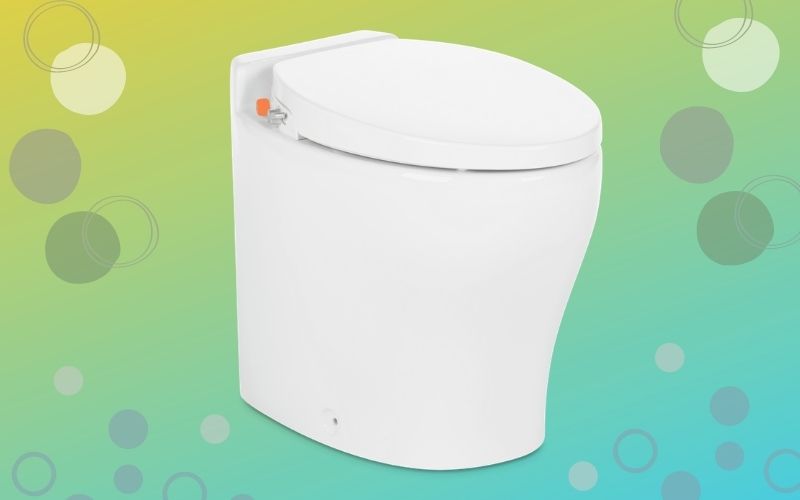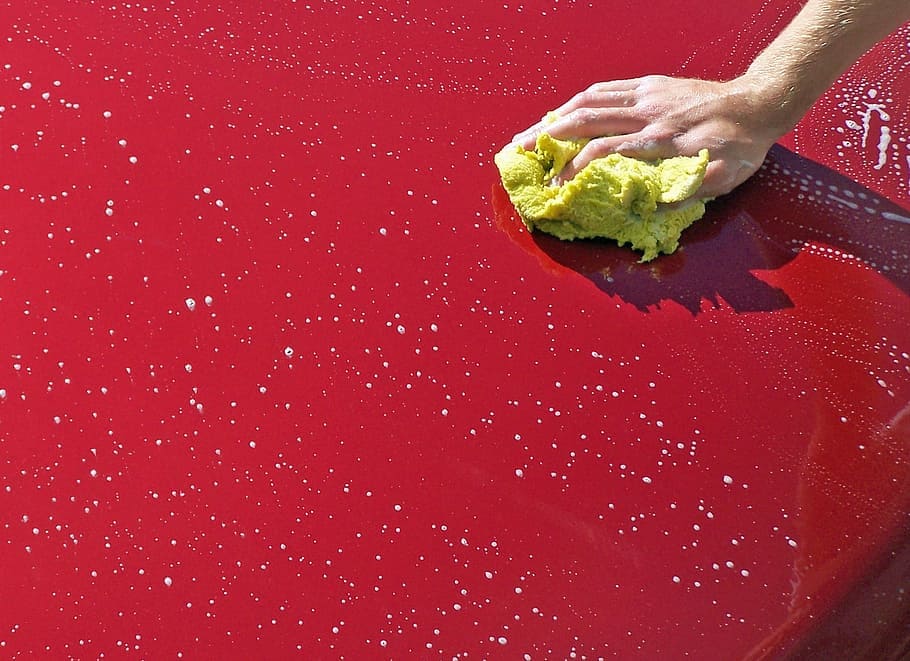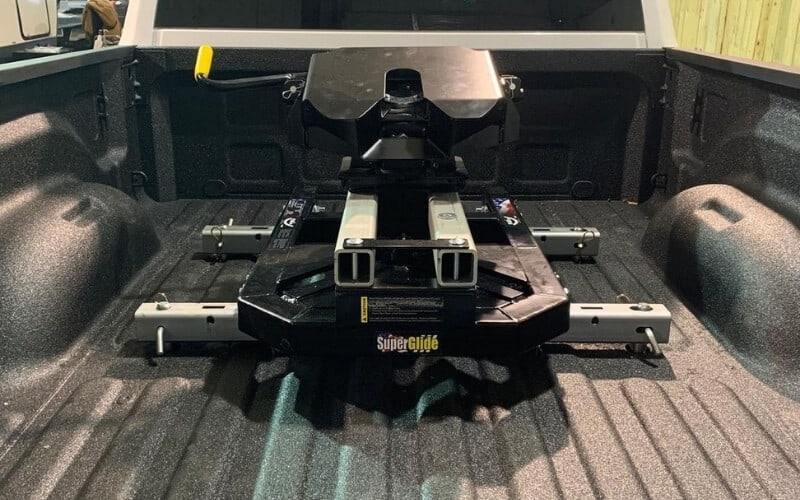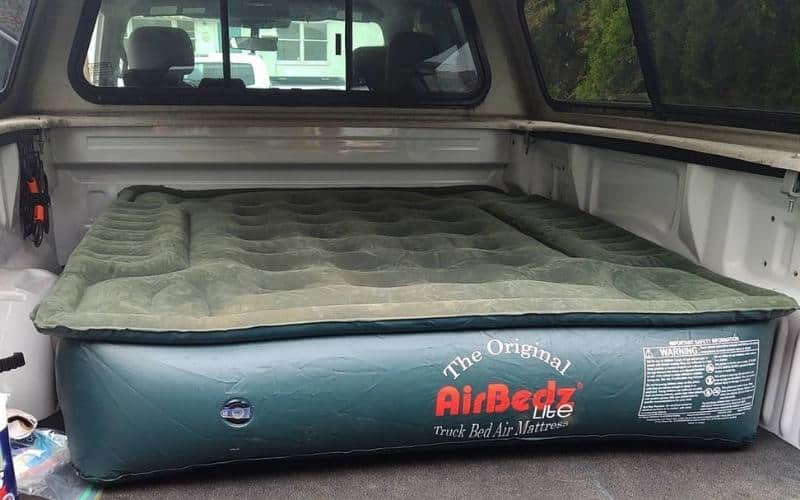One if the greatest luxuries of traveling in an RV is the toilet, but not all RV toilets are created equally.
Most people have seen portable toilets and standard gravity flush toilets, but there are also several other styles made for different needs and uses. One of these lesser-known options is the RV macerating toilet.
Instead of simply flushing and collecting waste, RV macerating toilets grind it up into a liquid slurry that can then be emptied through a thin hose.
But how do macerating toilet work, and under what circumstances is a macerating toilet the right choice for your RV? We got down and dirty with RV macerating toilets to give you the full scoop on what they’re all about.
What Is a Macerating Toilet?
The verb macerate describes softening and breaking apart food with a liquid, and that’s exactly what a macerating toilet aka “upflush toilets” do.
Unlike other toilets that simply collect waste, macerator toilets break down all Number Ones, Twos, and Threes that go down the toilet into a thick liquid.
This liquid is then pumped through a hose into a holding tank or waste receptacle.
How Does A Macerating Toilet Work?
Macerating toilets are considered to be a bit fancy in terms of RV toilets. Between being electrically powered and making waste disposal easy, macerating toilets provide the sweet luxury of not having to get your hands dirty with toilet waste.
Macerating toilets grind up all flushed waste using a motorized grinder similar to a garbage disposal.
This liquid slurry is then pumped into a holding tank, where it is stored until you’re ready to empty it.
Pros of RV Macerating Toilets
RV macerating toilets couldn’t be considered “fancy” if they didn’t come with some noteworthy benefits.
From reduced mess to increased flexibility, the pros of RV macerating toilets make them stand out from the rest.
Mess-free Dumping
Some RV toilets require large hoses that can drip, while others require you to get face-to-face with the waste on a regular basis – but not macerating toilets.
In fact, one of the main reasons for choosing an RV macerating toilet is the way in which waste is disposed.
Once the waste is ground down into a slurry, it can be discharged through a thin hose, like a garden hose, that’s only around an inch wide.
Using a smaller hose means less stink in the air, and it makes avoiding spills and drips easier than it is with a standard three-inch hose.
Place it Where it Fits
Macerating toilets allow you more flexibility in where you dump your waste, as well as where they can be installed in an RV.
Standard RV toilet have to sit directly over black water tanks and empty downward with the use of gravity.
Macerating toilets, however, offer more flexibility by using an electric pump to push waste through a hose. This means that waste can be dumped to further distances, and even uphill!
The hose used to discharge the waste can also easily be run where you need it, which accommodates installing macerating toilets anywhere they fit best.
This allows greater flexibility in the layout designs of RVs, and even allows you to add a toilet to a space without needing another black water tank.
Feels Like Plumbing
Part of the luxury of traveling in an RV is taking the basic comforts of a house with you. Macerating toilets take this to another level because using them actually feels a lot like using a standard toilet.
They come with a push-button flush rather than a foot pedal or side latch, and the bowl automatically refills with water after each flush.
Macerating toilets also give you toilet tissue freedom. Having to choose septic-safe toilet tissue, like standard gravity RV toilets require, can leave you with slim pickings.
However, because macerating toilets grind up all solid waste, they allow you the luxury of cleaning yourself with the same type of toilet tissue you prefer with a standard plumbing system.
No Lingering Odors
You’ll never have to worry about toilet odors creeping into your RV through a macerating toilet.
While other RV toilets require you to open the path to the holding tank every time you flush, macerating toilets seal off completely.
This prevents lingering odors that can come from stored waste and is especially desirable for anyone lives in their RV full-time.
Cons of RV Macerating Toilets
Despite the luxury and flexibility of macerating toilets, there are a few downsides as well.
Macerating toilets bring more to the table, but their overall use and maintenance also requires more money, more water, and more time.
High Price Tags
Macerating toilets have more features than other RV toilets, which naturally means they come with a higher price tag as well.
One macerator toilet can cost double, even triple what other RV toilet models may run you, with many macerating toilets costing $800-$1,600.
Even just a macerator pump alone will cost several hundred dollars to add to an existing sewage system.
Electrically moving gears and powered parts also mean more potential for breaks and costly repairs than you’d encounter with other types of RV toilets.
Macerating toilets need lots of water to operate. Water is needed to run the flush cycle, and not having enough can gunk up and potentially break the system.
This makes it difficult to dry camp for any extended period of time, as a large portion of your freshwater supply would necessarily go down the toilet.
Most macerating toilets are also powered by electricity, which means they require a power source.
While this isn’t an issue so long as you have a working electrical hook-up, power failures or a dead RV battery could escalate the situation by leaving you without a working toilet as well.
Dumping Waste Takes Some Time
Smaller hoses may be less messy than large ones, but they also leave less room for waste to pass through.
Even with an electric pump, dumping waste through a garden hose tends to take significantly longer than discharging through a traditional RV sewage hose.
It is also important to monitor the process of dumping macerating toilets to ensure that none of the following problems occur in the process:
- Unwanted pressure in the hose that can lead to a big mess
- Not enough water running through the hose and flushing out the waste
- An electrical shortage that turns the pump off and lets the waste sit and dry in the hose
Although a macerator system gives you flexibility in where you can dump your toilet waste, it may unnecessarily make the process longer for anyone who doesn’t need the increased access.
Macerating Toilet vs Exterior Macerator Pump
There are two types of macerators that can be used with RVs – the macerating toilet and the exterior macerator pump.
Macerating toilets are self-contained unit, complete with the grinder and holding tank.
They can be installed wherever they fit best, and are emptied either into a black water tank, or directly into a sewage disposal.
Exterior macerator pumps are an addition to any RV septic systems. They attach to the waste tank gate valve and come as either a removable attachment or a permanent installation.
Macerating toilets grind up waste, but standard models don’t have the power to pump waste long distances or uphill.
Exterior macerator pumps, on the other hand, can do both. They grind up waste within the pump, then move it down the hose to the receptacle.
While macerating toilets are made for ease and comfort of use, exterior macerator pumps are made for versatility.
Both can be handy features, but it is important to figure out your specific RV toilet needs before deciding which type of macerator, if any, is right for you.
Best RV Macerating Toilets
Not all macerating toilets are created equally. Models will vary in size, shape, and price as different features are altered and improved.
Below are two of the best RV macerating toilets currently on the market, along with what makes them stand out from the rest.
1: dometic 7640 Master Flush Ceramic Toilet
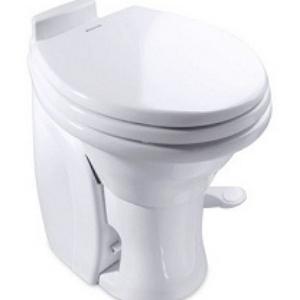
The Master Flush 7640 is made for anyone looking to upgrade their RV bathroom. This porcelain throne is innovative, eco-conscious, and budget friendly.
As the first RV macerating toilet with a foot-pedal flush, this toilet is perfectly built to replace standard RV gravity flush toilets.
And with a completely sealed-off holding tank, there is no risk of odors creeping up into the RV.
One of the most notable features of this toilet has to do with its water usage.
While many other models with water-conscious designs still use an average of 1 gallon of water per flush, the MF 7640 uses nearly half of that. Its dual-flush mode uses only.
64 gallons per normal flush, and only a mere .17 gallons on the low flush setting. Furthermore, this macerating toilet even drains gray water that runs off from the sink.
Priced at under $1,000, the MF 7640 makes the luxury of owning a macerating toilet accessible.
2: Thetford 38457 Plus 2 Mode 12V RV Toilet
The best part about this macerator toilet by Thetford isn’t its elegant design or that the powerful pump is surprisingly quiet.
No, the best part is that it combines the luxury of a macerating toilet with the pumping power of an exterior macerator pump.
This self-contained unit is modeled after European toilets. A molded plastic seat and cover sit on a porcelain base, merging both style and comfort.
The complete unit includes a macerator and a pump system that’s powerful enough to pump waste up to 120 feet with an 8-foot rise.
This toilet also stands out because of its eco-friendly design that minimizes the necessary amount of water.
Elegant and efficient, this all-in-one design can meet the needs of anyone shopping for a macerator system.
Are Macerating Toilets Worth It?
Macerating toilets are only worth it if you have one of the specific problems that they solve.
A macerating toilet may be the right choice for your RV if:
- You live in your RV and want the feel of a residential house
- You wish to customize the layout of your RV or you want to add a toilet somewhere other than directly over the black water tank
- You want to dump your waste at home
Macerating toilets bring a touch of luxury and some unique features to RV toilets, but their expensive price tags and dependence on water and power may make you want to reconsider.
Unless you have a specific need for a macerator system, you’ll likely find another type of RV toilet to be a better fit.

